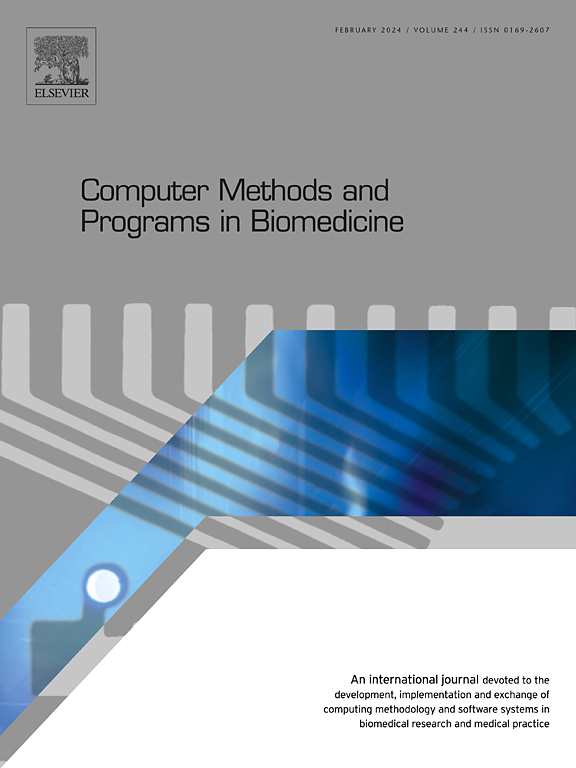调查脑萎缩对经颅直流电刺激的影响:使用 ADNI 数据集的计算研究。
IF 4.9
2区 医学
Q1 COMPUTER SCIENCE, INTERDISCIPLINARY APPLICATIONS
引用次数: 0
摘要
背景:经颅直流电刺激(transcranial direct current stimulation,tDCS)是一种非侵入性脑刺激技术,它利用微弱电流调节大脑活动,从而有可能帮助治疗脑部疾病。虽然 tDCS 带来了便利,但它产生的电场分布却因人而异。这种不一致性可能与某些因素有关,例如脑萎缩。脑萎缩伴随着脑脊液(CSF)容量的增加。由于脑脊液具有高导电性,其体积增大会使电流传递到大脑的过程变得复杂,从而导致受试者之间的差异增大:我们的目的是研究不同脑萎缩程度的群体在 tDCS 诱导的电场方面的差异:我们根据阿尔茨海默病的存在和性别将 180 张磁共振图像分为四组。我们使用了两种蒙太奇,即 F-3 和 Fp-2 以及 TP-9 和 TP-10,分别以左侧喙中额回和海马/杏仁核复合体为靶点。分析了各组在区域体积变化、刺激效果和相关性方面的差异:结果:观察到 CSF 和两个目标区域的几何变化存在显著差异。tDCS 诱导的电场在男女两性中相似。在相关性分析中,每个组都观察到了独特的模式:我们的研究结果表明,脑萎缩等因素会影响 tDCS 的结果,而且这些因素之间存在复杂的关系。为了更好地理解这些因素之间的关系并优化作为治疗工具的 tDCS,有必要开展进一步的研究。本文章由计算机程序翻译,如有差异,请以英文原文为准。
Investigating the effect of brain atrophy on transcranial direct current stimulation: A computational study using ADNI dataset
Background
Transcranial direct current stimulation (tDCS) is a non-invasive brain stimulation technique that uses weak electrical currents to modulate brain activity, thus potentially aiding the treatment of brain diseases. Although tDCS offers convenience, it yields inconsistent electric-field distributions among individuals. This inconsistency may be attributed to certain factors, such as brain atrophy. Brain atrophy is accompanied by increased cerebrospinal fluid (CSF) volume. Owing to the high electrical conductivity of CSF, its increased volume complicates current delivery to the brain, thus resulting in greater inter-subject variability.
Objective
We aim to investigate the differences in tDCS-induced electric fields between groups with different severities of brain atrophy.
Methods
We classified 180 magnetic resonance images into four groups based on the presence of Alzheimer's disease and sex. We used two montages, i.e., F-3 & Fp-2 and TP-9 & TP-10, to target the left rostral middle frontal gyrus and the hippocampus/amygdala complex, respectively. Differences between the groups in terms of regional volume variation, stimulation effect, and correlation were analyzed.
Results
Significant differences were observed in the geometrical variations of the CSF and two target regions. Electric fields induced by tDCS were similar in both sexes. Unique patterns were observed in each group in the correlation analysis.
Conclusion
Our findings show that factors such as brain atrophy affect the tDCS results and that the factors present complex relationships. Further studies are necessary to better understand the relationships between these factors and optimize tDCS as a therapeutic tool.
求助全文
通过发布文献求助,成功后即可免费获取论文全文。
去求助
来源期刊

Computer methods and programs in biomedicine
工程技术-工程:生物医学
CiteScore
12.30
自引率
6.60%
发文量
601
审稿时长
135 days
期刊介绍:
To encourage the development of formal computing methods, and their application in biomedical research and medical practice, by illustration of fundamental principles in biomedical informatics research; to stimulate basic research into application software design; to report the state of research of biomedical information processing projects; to report new computer methodologies applied in biomedical areas; the eventual distribution of demonstrable software to avoid duplication of effort; to provide a forum for discussion and improvement of existing software; to optimize contact between national organizations and regional user groups by promoting an international exchange of information on formal methods, standards and software in biomedicine.
Computer Methods and Programs in Biomedicine covers computing methodology and software systems derived from computing science for implementation in all aspects of biomedical research and medical practice. It is designed to serve: biochemists; biologists; geneticists; immunologists; neuroscientists; pharmacologists; toxicologists; clinicians; epidemiologists; psychiatrists; psychologists; cardiologists; chemists; (radio)physicists; computer scientists; programmers and systems analysts; biomedical, clinical, electrical and other engineers; teachers of medical informatics and users of educational software.
 求助内容:
求助内容: 应助结果提醒方式:
应助结果提醒方式:


